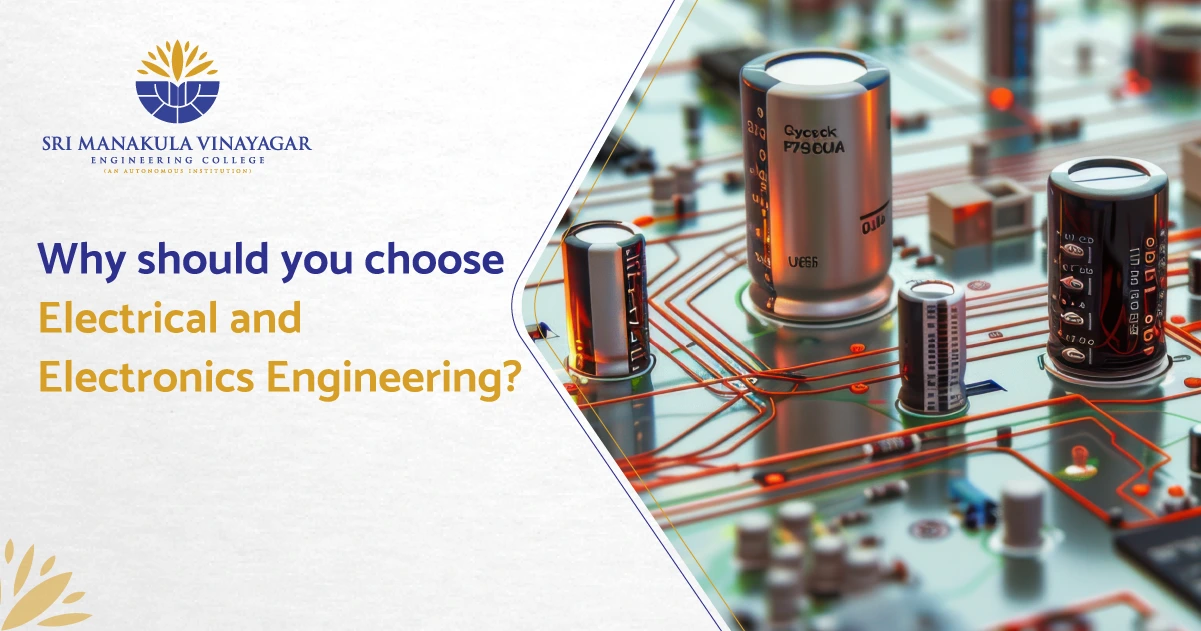Introduction
Have you ever asked questions about who powers the indispensable gadgets and systems behind renewable energy? Time to welcome, to enter into the world of Electrical and Electronics Engineering: This field is very much alive and requires a fair amount of creativity, analytical thought, and technical know-how for the generation of technologies that transform our lives. A career in Electrical and Electronics Engineering not only provides flexibility but also places you at the forefront of modern technological revolutions. Let’s see what makes this the greatest career for you!
| Did You Know?There is great demand for skilled electrical and electronics engineers across the world and it is expected to maintain its steady growth pace at least until 2030. EEE graduates can work in a variety of fields ranging from aerospace to automation and power generation to IT. Most of the important inventions, such as smartphones, electric vehicles, and satellite systems, are possible because of EEE innovations. |
High Demand In Emerging Technologies
The new technologies that are developing rapidly are intricately dependent on the electrical and electronic systems in which an engineer would work in the following areas:
- Artificial Intelligence-Machine Learning
- Internet of Things-Machine-to-Machine
- Electric Vehicles
- Smart Grids and Energy Storage Systems
Excellent Salary Prospects
The U.S. Bureau of Labor Statistics states that electrical engineers earned about $100,000 in practice median annual salary during 2023, with further potential for vastly higher salaries depending on specialization and experience. EEE graduates in India are now also being offered attractive packages, mainly in energy, IT, and R&D.
Opportunities For Higher Studies And Research
Electrical and Electronics Engineering presents great opportunities for those interested in pursuing higher education. The choice of postgraduate studies includes;
- M.Tech in Power Systems, Control Systems, VLSI, etc.
- MBA in Technology Management.
- Research in Quantum Computing, Renewable Energy Systems.
- Specialized master’s and doctoral programs in EEE are offered by top global universities.
Contribution To Sustainable Development
Want to pursue a meaningful career? Electrical and Electronics Engineering drives this purpose. It is the engineers in this field who lead innovations that make clean, efficient energy more accessible, thus making your work the true crux of a better and greener planet. Here is what:
1. Renewable Energy Systems
The EEE professionals would design, develop, and optimize solar panels, wind turbines, hydroelectric systems, and geothermal solutions. Then they would take them to the next level by making these systems more efficient, reliable, and scalable for mass adoption.
2. Smart Grids
These are electrical engineers who build smart grids, which means, above all, intelligent networks, i.e., those that operate automatically to balance electricity supply and demand, manage waste energy, and incorporate renewables effectively.
3. Energy Storage Solutions
The main challenge with renewables is storage. The EEE specialists are working on advanced battery technologies, supercapacitors, and energy management systems to store excess energy efficiently for possible future expenditure.
4. Electric Vehicles (EVs) And Charging Infrastructure
Transitioning to electric transport is essential for removing carbon from the environment. Charging infrastructures, power systems for EVs, and battery management units that the EEE engineers develop would guarantee that electric mobility will be widely adopted and eco-friendly.
5. Innovations In Energy Efficiency
From energy-efficient appliance design to power electronics enhancements and low-power integrated circuits development, E.E.E. professionals play a major role in reducing all forms of energy consumption in industries and households.
Key Skills You’ll Develop As An EEE Graduate
- Circuit Design And Analysis:
Skilled at generating and troubleshooting electrical circuits Master
- Problem-solving:
Analytical reasoning to solve difficult engineering puzzles
- Programming And Simulation:
Familiarity with MATLAB, Simulink, and embedded systems
- Control Systems:
Knowledge of automated and feedback
- Electronics And Communication:
Competence in analogue/digital electronics and signal processing
- Project Management:
Planning, executing, and directing engineering projects
- Work In Teams and Communicate:
Effective cross-discipline collaboration
Career Opportunities After Electrical And Electronics Engineering
Fields Of Electrical Engineering
- Power Generation & Distribution
- Energy Systems Management
- Intelligent Network Technology
Key Areas Of Electronics
- Semiconductor
- Embedded Systems
- Consumer Electronics
Interdisciplinary Fields
- Robotics Engineering
- Medical Equipment Design
- AI and IoT
EEE Graduates Often Work As:
- Electrical Design Engineer
- Electronics Engineer
- Systems Developer
- Automation Engineer
- Researcher.
Scope Of Electrical And Electronics Engineering In Healthcare
- Medical Devices:
E and E engineers design and maintain essential machines such as MRI, ECG, and CT scanners.
- Health Devices:
The latest smart wearable technology, from smartwatches to health trackers, is designed utilizing advanced sensor systems in addition to wireless communication-invented fields of work by EEE professionals.
- Health Solutions By Telemedicine:
The latest technologies in IoT and embedded systems allow EEE to create remote consultations and patient monitoring to improve health access among patients.
- Hospital Automation:
The engineering of power management, surgical robotics, and smart infrastructure is intended to ensure that hospitals function efficiently and sustainably.
Sri Manakula Vinayagar Engineering: College For Not Just EEE
Sri Manakula Vinayagar Engineering College is a name for quality education in Electrical and Electronics Engineering and here are the reasons why we stand out:
- State-of-the-art laboratories for learning by doing
- Curriculum designed keeping in view industrial orientation and technology of tomorrow
- Good placements with top MNCs and core companies
- Collaborative projects with some of the leading firms in healthcare-IT-energy
- We do not just teach EEE; we empower you to lead into the future!
Conclusion
Electrical and Electronics Engineering means more than circuits and wires; it is the lifeline of the modern world! From healthcare devices of the next generation to powering sustainable cities to intelligent robots, the fields of Electrical and Electronics Engineering are infinite in possibilities. Good job prospects, hefty pay, and an opportunity to positively impact the world: with a view like that, working towards an EEE graduation means working towards a carefree, bright, and electrifying future!
FAQs On Electrical And Electronics Engineering
1. Does a career in Electrical Engineering seem to be a good choice?
Yes, it indeed has a wide spectrum of applications in industries such as healthcare, AI, energy from renewables, and robotics. Thus, very good job chances and growth in EEE.
2. What are the skills that lead to success in Electrical and Electronics Engineering?
The analytical ability to think positively, solve problems, apply basic mathematics, have a working knowledge of entry-level programming, and be a good team player will take you far in achieving success in this profession.
3. What is the link between electrical and electronics engineering and healthcare?
EEE professionals design and maintain critical healthcare technologies such as imaging equipment, wearable devices, and telemedicine infrastructure.
4. Can I go into IT after completing Electrical Engineering and Electronics?
Definitely! The IT industry clamours for EEE graduates to fill positions such as software developers, embedded systems designers, and, obviously, AI specialists.
5. What kind of research opportunities are there in Electrical and Electronics Engineering?
Some areas for research in Electrical and Electronics Engineering include renewable energy systems, robotics, artificial intelligence (AI) integration, smart health devices, and semiconductor technology.



